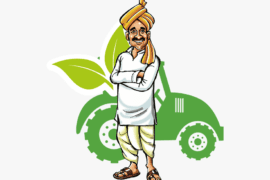Introduction
In 1998, when I was part of the Prime Minister Atal Bihari Vajpeyee’s Task Force on Food and Agri Management Policy, we present set of recommendations that would transform the sector and affect the overall food security of India. The 70-page report outlined the issues across the agri value chain. To align the country, we gave the slogan to the Honorable Prime Minister:
“Kisan Ugaye (farmer grows)
Janta Khaye (population feeds)
Aur Desh Aage Badh Jaye” (and the country advances)
The current Farm Bill which is being politically contested is just addressing one part of the overall agri value chain. Back then in 1998, over INR 55,000 crores of agri produce is wasted every year due to inadequate infrastructure to the latest estimate of INR 44,000 crores. This is hardly a dent over the last 22 years in curbing the loss of farm produce. Over the last 70 years of independent India, the so called ‘middlemen’ have not added value nor reduced the farm produce losses. However, this is not the purpose of my blog today. There were several recommendations that were put forth and accepted by the Government in 1998. Unfortunately, the political and administrative will and intent was missing. I would like to recall some of the key recommendations that would need to form part of the Next Generation of Food and Agri Reforms in India.
Setting Agenda for Next Generation of Food and Agri Reforms in India
India’s current agri output is around USD 300 billion and provides food security for one season. There are several items on the agenda to double this output to around USD 500 billion by 2030. These include reducing the number of Ministries and Departments that manage the agri value chain, to setting up the Next Green and White Revolution to increase productivity to global norms, investment in smart infrastructure and digitization of agriculture, funding agriculture, food processing to enable farm to fork, agri labour reforms amongst a few. Let’s discuss the important agenda items one by one.
Super Food and Agri Ministry
In the current Government, there are following Ministries across the food and agri value chain:
- Ministry of Chemicals and Fertilizers
- Ministry of Consumer Affairs, Food and Public Distribution
- Ministry of Agriculture and Farmers Welfare
- Ministry of Food Processing Industries
- Ministry of Environment, Forest and Climate Change
- Ministry of Animal Husbandry, Dairying and Fisheries
This is still a manageable number from over 14 Ministries in 1998. Compare this with a single Ministry of Agriculture, Fisheries and Food (MAFF) in the UK which manages the administration of the entire value chain.
Next Green and White Revolution in India
In 1998, we had outlined several recommendations that would lead to doubling of the agri productivity to reach global norms in various agri produce per hectare. Over the last 20 years there have been several advances in agri and animal husbandry technology which would need to be rolled out at the farm level to increase the produce on reduced land supply for agriculture due to increasing population pressure. These include agri biotech innovations, precision farming, multi-level farming, organic pesticides and fertilizers and so on. The issue of land fragmentation over the last 20 years have become fairly acute and as time elapses, would accentuate further affecting the productivity. Newer technologies and consolidation to intensify agri on limited land due to population pressure is to be developed. Lastly, the issues of climate and environmental change over the 20 years have become very visible and would need technologies and crop rotation to mitigate agri failures due to climate and environmental changes that are occurring rapidly over the last decade. My work with Department of Biotech (DBT) in setting up the Biotech Ignition Grant (BIG) Policy in 2011-12 was muted to enable innovations in agri biotech and start up to obtain grants to commercialize their concepts and innovation in this area.
Investment in Smart Infrastructure and Digitization of Agricultural Value Chain
There are several developments on the information technology front which has yet to be adopted by Indian agriculturalists. Several product innovation start ups are working on solving some of these issues. We would need to accelerate the adoption as well as new innovation in IoT and remote sensing, big data and artificial intelligence, smaller farm implements for mechanizing small farm holdings, robotics, full stack farm 2 fork digital solutions. In 1998, ITC’s eChaupal was drubbed as an innovative path and way forward for Indian agriculture. Times and technology have advanced by leaps and bounds. Indian agriculture must adopt these quickly and aggressively. This also brings another issue of digital education for the farmers and labourers in upskilling them in these new tools and techniques leveraging deep tech in agri.
New Age Food Processing to Enable Farm 2 Fork
In 1998, several recommendations were made to invest into the food processing and logistics to enable quicker movement of fresh produce from the farm 2 fork. A lot has been done in this front. However, the data on infra investments in this space show a skew towards the top-5 states of India. Another area of innovation is adoption of newer and latest food processing technologies with our ‘jugaad’ innovation including the cold chains and refers. The Covid vaccine distribution cold chain which would be an episodic exercise could be turned to alternative use post endemic in the remotest parts of India to create the linkages of cold chain.
Agri Labour Reforms
Several recommendations have been made to consolidate the farms and contract farmers into co-operatives and social enterprises. One of the steps in the right direction would be the Social Stock Exchange where these social agri enterprises can be listed and be professionally managed with transparent governance and funding. The other issue that is reskilling and employment generation for the displaced labour due to implementation of new age deep tech which would replace manual farm labour. We had recommended around 15% of undisguised labour to be migrated out of agriculture to other sectors for employment. During the Covid Crisis, Rural BPOs have grown over 10-fold, its these ideas for alternative employment generation and reskilling that needs to creatively addressed.
Finally, Funding, Funding, Funding
Apart from the Central and State Government budgetary support to the sector for funding and apex financial institution NABARD, in the last 20 years there were a few focused providers of risk capital to this sector which I can count on my finger tips. These included PE/VC offshoots of large corporate houses with interest in food and agri and multinational agri-focussed banks. I believe the ESG Funds, new age VCs and the Social Stock Exchange Regulations will provide newer players to step into this sector. One of the hang over of the last 20 years had been the accumulated gun-powder that needs to be monitised.
Why Food-Health Alchemy is the Need?
As an investor in core healthcare sector, why am I writing this to set up the discussions on food and agri reforms? Our learning from our investments in nutrigenomics venture was that the new age diseases and syndromes emerging in healthcare is the outcome of what we eat. The food and nutrition consumption basket of Indians has dramatically altered over the last 20 years since my Britannia days. The national well being of Indian population depends on the nutritional outputs from the food and agri sector. Therefore I may now like to alter the slogan which we coined in 1998 to
“Kisan Ugaye (farmer grows)
Janta Khaye (population feeds)
Kisan aur Janta Swasth Rahe (farmer and population remains healthy)
Aur Desh Aage Badh Jaye” (and the country advances)
For more recent update on the issue of Farm Bill and Agri and Agritech Reforms listen to QuoteUnQuote with KK – Kapil Khandelwal (KK) and Mark Kahn on The Future of Agriculture: AgriTech and Government Reforms

